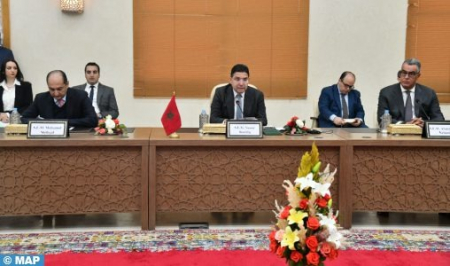Morocco-Ivorian Ties, ‘Strategic Partnership’ Powered by Two Leaders’ Commitment to a United Continent – FM
Minister of Foreign Affairs, African Cooperation and Moroccan Expatriates Nasser Bourita described Morocco-Ivorian bilateral relations on Friday in Laayoune as a “benchmark” and a “strategic partnership”, drawing strength from the ambition and commitment of the two countries’ Heads of State to a united and prosperous African continent. Speaking at the fifth session of the Morocco-Côte d’Ivoire Grand Joint Cooperation Commission, Bourita stressed that these ties, which have always developed significantly at various levels thanks to the enlightened vision of His Majesty King Mohammed VI, may God assist him, and his brother His Excellency President Alassane Ouattara, continue to enshrine their economic and strategic synergy. Described as a “reference” and a “strategic partnership”, these relations draw strength from the ambition and commitment of the leaders of both countries to a united and prosperous African continent, he added. Holding this session reflects the quality of relations between the two countries and testifies to the solidity of their historical ties, Bourita stated, noting that this meeting provides an ideal opportunity to strengthen political consultations and the ongoing dialogue established over decades between Morocco and Côte d’Ivoire, as well as to provide a framework conducive to debate on the future of Morocco-Ivorian relations, a key pillar of adapting to the current realities of the African continent. He welcomed the positive outcome of this partnership, which represents an innovative model of South-South cooperation between two African countries, noting that the partnership is based on solid foundations, realistic in its content and diversified in its partners. The two countries have thus worked to promote their partnership in various fields, such as infrastructure, he further said. According to the minister, the Morocco-Côte d’Ivoire Grand Joint Cooperation Commission is a major step in the process of bolstering strategic partnership between the two countries, and illustrates the commitment of their leaders to work together to give new impetus to bilateral relations in all sectors, by reactivating the mechanisms provided for under the Economic Impetus Group. The head of Moroccan diplomacy also highlighted the important political and economic coordination mechanisms linking the two countries, as demonstrated by the significant Moroccan economic presence in Côte d’Ivoire, unrivaled in Africa. In this respect, Bourita noted, “the agreements to be signed during this ministerial session will pave the way for the creation of a favorable business environment and the expansion of areas of win-win partnerships between the Moroccan and Ivorian parties”. In addition, the Minister expressed his gratitude to the Minister of Foreign Affairs, African Integration and Ivorians Abroad, Kacou Houaja Léon, for his country’s firm and clear stance on the territorial integrity of the Kingdom of Morocco, and for its permanent and historic support for the Moroccan Sahara, adding that “at international level, Côte d’Ivoire has always been among the fervent defenders of Morocco’s right to its Sahara and the legitimacy of its national cause. This constant support led to the opening, on February 18, 2020, of a Consulate General of Côte d’Ivoire in Laayoune”. In light of achievements and future prospects, Bourita noted that although bilateral trade relations are highly developed, further diversity is required in order to elevate these ties to the level of the two brotherly peoples’ aspirations, calling on Moroccan and Ivorian economic operators to seize the opportunities offered by both countries to boost their partnerships and increase investment in technology, with a view to meeting the challenges of sustainable development. As part of the bonds of solidarity with the Republic of Côte d’Ivoire, he reiterated Morocco’s full readiness to work towards the implementation of new mechanisms for exchanges and sharing experience in the scientific and technical fields between various Moroccan institutions and their Ivorian counterparts. In this respect, he noted that the government of Côte d’Ivoire had clearly displayed its political will and serious commitment to the completion of the African Atlantic gas pipeline project, through signing the tripartite memorandum of understanding in June 2024, recalling that “this mega-project, whose construction is currently at an advanced stage, stands as the symbol of South-South cooperation and aims to benefit more than 340 million people in the West African region, as well as guaranteeing the evolution of the African development model His Majesty King Mohammed VI, may God assist him, has always advocated”. Aware of the challenges facing the African continent, His Majesty has kindly launched several initiatives to the benefit of countries of Atlantic Africa, notably that aimed at facilitating access for the countries of the Sahel to the Atlantic Ocean, in order to foster a new era of mutual development, stability and prosperity for all African peoples, Bourita recalled. He added that these structural projects are an excellent case in point of South-South cooperation, which should be encouraged by African countries to achieve the objectives of the African development model.

